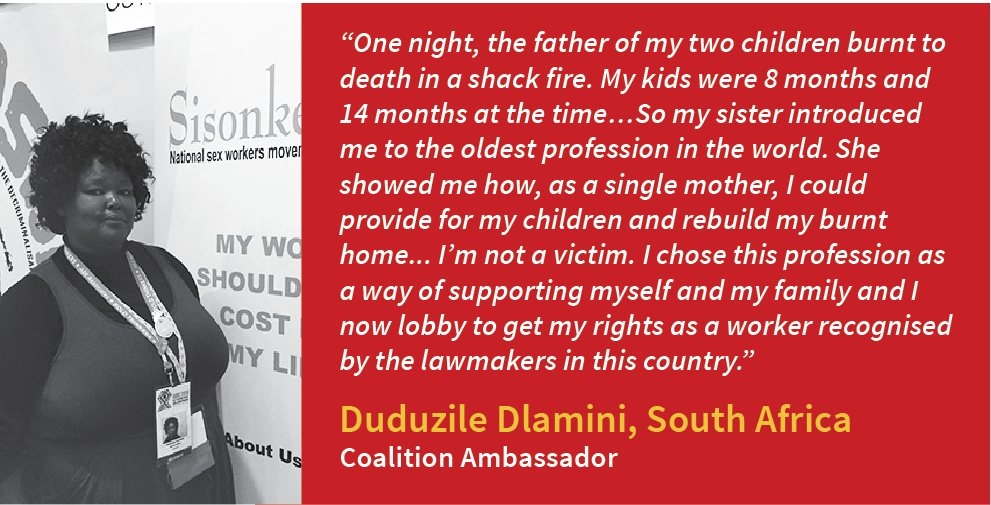Interview with Coalition Ambassador Dudu Dlamini
Duduzile Dlamini runs the Sisonke project, a movement of sex workers in South Africa, helping them to fight for their rights and entitlements. This project is part of SWEAT Mothers for the Future, South Africa.
Dudu is an experienced global advocate of sex worker rights. She also led field research in South Africa that was used to develop the Coalition’s recent work on the children of key populations. Her organisation has taken up this issue in its programming.

My experience
Being a mother, a sex worker and affected by HIV, there is a lot of stigma. People believe that sex workers are the ones who are spreading HIV. Going to the clinic can be challenging because the people who work there are really not friendly to sex workers. And, even if a sex worker can get herself to the clinic, she might get arrested and not allowed to take medication. The risk of criminalization is very challenging.
The stigma sex workers experience also affects their children. When a sex worker is arrested, there is nobody to take care of her children and to make sure they take their medication. If she does get someone to look after her children while she works or when she is arrested, she must then pay more money. Because of the poverty of sex workers, it is hard to make sure that their children eat, take medication and stay healthy.
We found through our consultations at Mothers for the Future that, if a sex worker died, the family often didn’t know her child was HIV positive. The mother might have been hiding her child’s status. When happens, then? Who makes sure that that child is taking medication correctly? Who will make sure that the child stays healthy to go to school and get the education they need? I am trying to find ways to make sure these families are not affected by discrimination.
When we did consultations with children affected by HIV, we went house-to-house, meeting different mothers, and found that there were more gaps than we even thought – in medication for children, stigma and discrimination. We saw a need for a whole package of social support for sex workers that also reaches their children.
There is a story we heard during our consultations about a mother who was a sex worker whose children were raped. People think her children deserve to be raped because of her work. Support wasn’t there for her and she just disappeared. Mothers for the Future is trying to prevent that from happening. We do this by supporting a sex worker who is pregnant and thinking about, “What can be done so that she can save her child from being affected by HIV? What is needed? What social support is important? What does she need to hide/not hide?”
The Coalition seeks the same things for children and HIV that I do
What makes me so excited about being a part of the Coalition is that it is a good opportunity to get more understanding and more research. We need to have research done to learn how we can fill the gaps. Now, being in the Coalition, I will be able to work with different countries and learn from their experiences and bring that information back to my country. I really appreciate this opportunity.
If I share my experience with the Coalition and put it on the table, we can learn how we can fill the gaps. It is also empowering us, as mothers, to make sure that we decrease the number of children affected by HIV.
The most important change I would like to see to help children affected by HIV and
The most important thing is making sure that children take their medication correctly and that they eat something. We need to make sure health and nutrition is there for children. We need to make sure that somebody is next to them, making sure that they take medication and that they have support.
What gives me the most hope
I am hopeful that people are working to take away fear. Medication is available. We do have treatment. We do have medication in clinics. Now, we can work with women who have children affected by HIV and empower them and educate them about how important it is to take the medication properly.
We need to make children feel comfortable about going to the clinic to get medication. We can show them that they are not alone; that there is support. There are groups where we can talk about it if they have a bad experience. We can help each other and support each other. We can build relationships between families.
The one message I want people to know about children affected by HIV
There are a lot of things that need to be done and gaps that need to be filled. The support structure is not only financial. For example, when a mother goes to a clinic and has a bad experience with the service provider, she may leave without taking her medication. Then she is not taking medication and her child is not taking medication, either. But a peer educator taking her to the clinic could make sure she makes peace with the care provider. Then she would get her medication and go back home to make sure her child takes their medication as well.
The things we need to do to fill the gaps for HIV-positive sex workers and their children are making sure medication is available, creating support groups, building strong relationships between mothers and their families, and taking away stigma and discrimination.